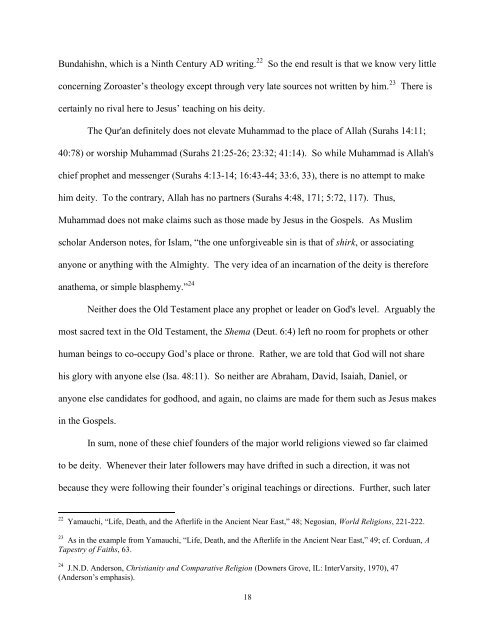Published by
299z7CN
299z7CN
You also want an ePaper? Increase the reach of your titles
YUMPU automatically turns print PDFs into web optimized ePapers that Google loves.
Bundahishn, which is a Ninth Century AD writing. 22<br />
So the end result is that we know very little<br />
concerning Zoroaster’s theology except through very late sources not written <strong>by</strong> him. 23<br />
There is<br />
certainly no rival here to Jesus’ teaching on his deity.<br />
The Qur'an definitely does not elevate Muhammad to the place of Allah (Surahs 14:11;<br />
40:78) or worship Muhammad (Surahs 21:25-26; 23:32; 41:14). So while Muhammad is Allah's<br />
chief prophet and messenger (Surahs 4:13-14; 16:43-44; 33:6, 33), there is no attempt to make<br />
him deity. To the contrary, Allah has no partners (Surahs 4:48, 171; 5:72, 117). Thus,<br />
Muhammad does not make claims such as those made <strong>by</strong> Jesus in the Gospels. As Muslim<br />
scholar Anderson notes, for Islam, “the one unforgiveable sin is that of shirk, or associating<br />
anyone or anything with the Almighty. The very idea of an incarnation of the deity is therefore<br />
anathema, or simple blasphemy.” 24<br />
Neither does the Old Testament place any prophet or leader on God's level. Arguably the<br />
most sacred text in the Old Testament, the Shema (Deut. 6:4) left no room for prophets or other<br />
human beings to co-occupy God’s place or throne. Rather, we are told that God will not share<br />
his glory with anyone else (Isa. 48:11). So neither are Abraham, David, Isaiah, Daniel, or<br />
anyone else candidates for godhood, and again, no claims are made for them such as Jesus makes<br />
in the Gospels.<br />
In sum, none of these chief founders of the major world religions viewed so far claimed<br />
to be deity. Whenever their later followers may have drifted in such a direction, it was not<br />
because they were following their founder’s original teachings or directions. Further, such later<br />
22 Yamauchi, “Life, Death, and the Afterlife in the Ancient Near East,” 48; Negosian, World Religions, 221-222.<br />
23 As in the example from Yamauchi, “Life, Death, and the Afterlife in the Ancient Near East,” 49; cf. Corduan, A<br />
Tapestry of Faiths, 63.<br />
24 J.N.D. Anderson, Christianity and Comparative Religion (Downers Grove, IL: InterVarsity, 1970), 47<br />
(Anderson’s emphasis).<br />
18


